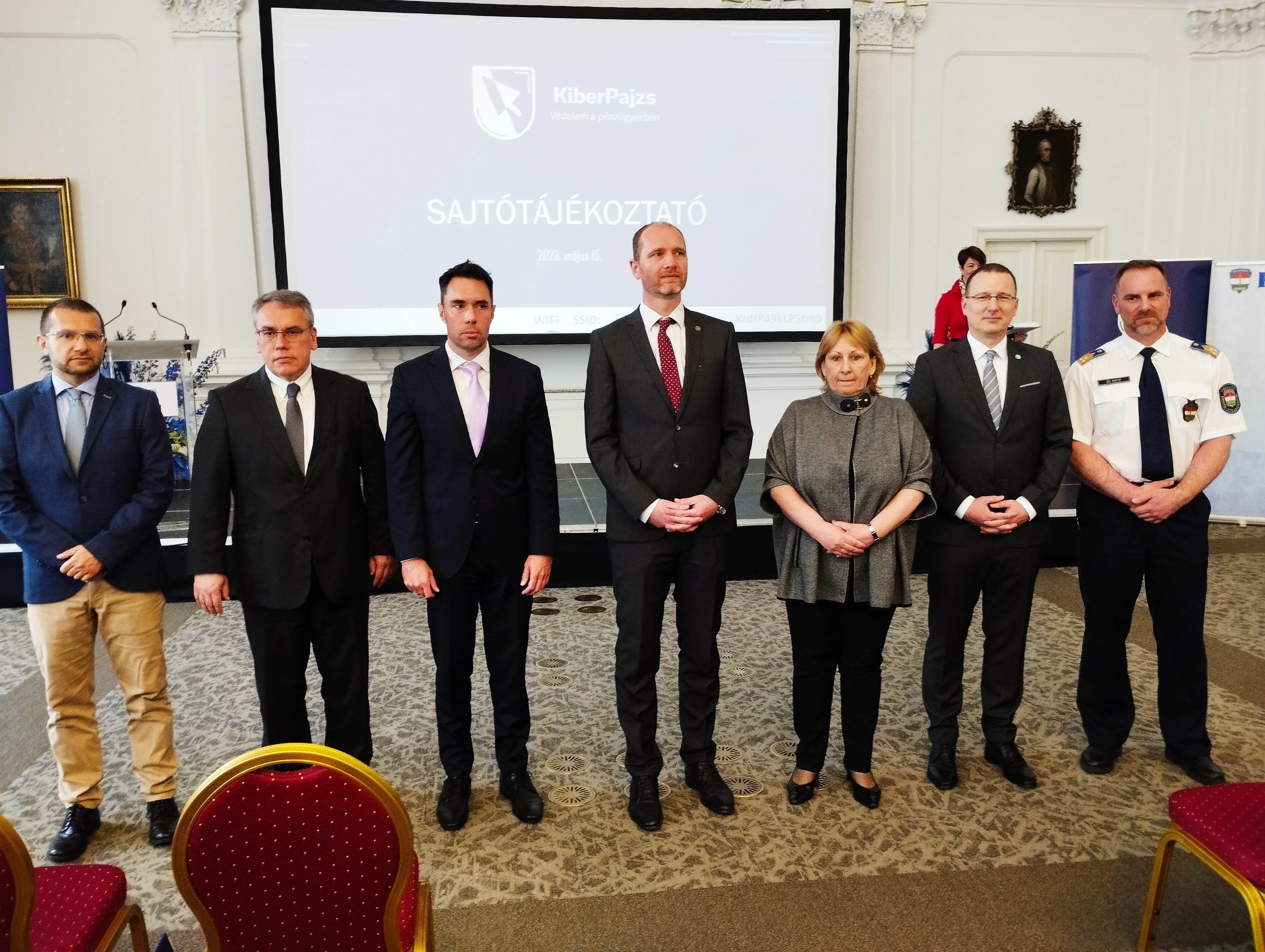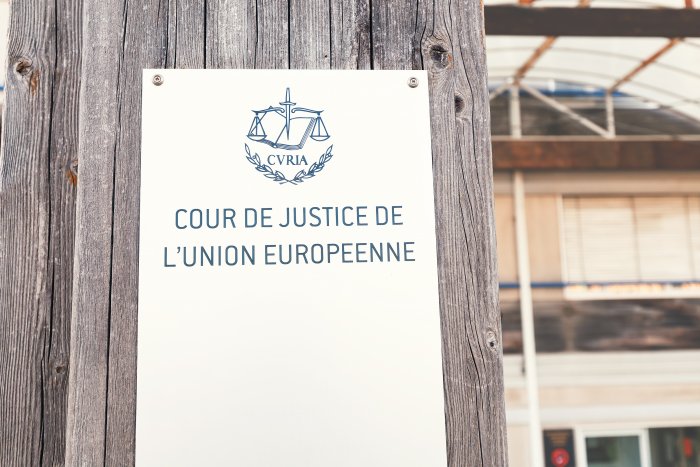Hungary’s CyberShield Program Expands to Better Withstand Digital Crime

From left: Ferenc Kardos, Media Union Foundation; Levente Kovács, Hungarian Banking Association; Marcell Bíró, Supervisory Authority for Regulatory Affairs; Lieut. Col. Gál Kristóf, National Police Headquarters.
As digital fraud cases surge across Hungary, the nation’s CyberShield program, designed to curb online scams, has been given a significant boost. The national Supervisory Authority for Regulatory Affairs (SZTFH) has joined the initiative, fortifying the defenses against cybercrime and enhancing digital security awareness nationwide.
The press conference announcing the expansion of the CyberShield program was held in the ballroom of the HQ of MBH Bank Nyrt. (formerly MKB Bank) on May 15. Its significance was underlined by the attendence of prominent figures from Hungary’s financial, law enforcement, and regulatory sectors, all dedicated to strengthening digital security.
These included Levente Kovács, secretary general of the Hungarian Banking Association; Csaba Kandrács, deputy governor of the National Bank of Hungary; Marcell Bíró, the president of the SZTFH; and Lieutenant Colonel Kristóf Gál, the spokesperson for the National Police Headquarters. Their collective presence highlighted the serious commitment and broad cooperation required to combat the persistent cybercrime problem effectively in Hungary.
According to Kovács, of the banking association, the frequency of digital scams in Hungary is alarming.
“Every day, a Hungarian family loses its entire savings due to cyber criminals, and every week, a Hungarian company suffers significant losses in the digital space,” the secretary general warned. He identified the weakest link in cyber defense as “the deceived person,” emphasizing the importance of strengthening the “digital immune system” to counter the rising threat.
The CyberShield program, launched in November 2022, initially united forces of the National Police Headquarters (ORFK), the Hungarian Banking Association, the Central Bank of Hungary (MNB), the National Media and Infocommunications Authority (NMHH), and the National Institute for National Cyber Defense. Later, the Ministry of Justice joined the initiative, contributing to victim support and consumer protection.
The recent entry of the SZTFH into the initiative expands its scope further. SZTFH president Bíró highlighted the staggering financial impact of digital fraud, “66% of companies were victims of fraud, paying more than HUF 250 million to fraudsters, while recovery costs exceeded HUF 500 million in the first two months of last year.”
Banking Collaboration
Ferenc Kardos, CEO of the Media Union Foundation, outlined the collaboration with the Hungarian Banking Association.
“The banking association was successful in responding to the Media Union Foundation’s call, which now enables us to use advertising platforms to disseminate the most important cybersecurity messages.”
He elaborated on the timeline and focus of the campaign. “The initiative, which kicked off in May 2023 and will run until the first quarter of 2024, is designed to draw attention to the perils of cyberspace, with a particular emphasis on financial and data protection threats.”
Lieut. Col. Gál of ORFK emphasized the importance of personal responsibility in preventing cyber fraud.
“We strive to alert the public in the broadest possible manner about the importance of not becoming victims. People must exercise caution and refrain from sharing personal or banking information over the phone, via SMS or email,” he said. To make this information more accessible, ORFK also takes a creative approach.
“At the [launch] event, we premiered short films designed to highlight the most common methods of online fraud in a way that is easy for the general public to understand and remember.”
The Hungarian Parliament voted recently to establish a cybersecurity certification framework, marking a significant leap in Hungary’s journey towards a more secure digital landscape. Bíró clarified that this system “will ensure that the SZTFH sets cybersecurity expectations and requirements for ICT products and services (excluding the military industry), evaluates their compliance, and promotes the market use of products that meet cybersecurity aspects.”
In response to a question from an MTI journalist, Kovács shared plans for additional collaborations with financial institutions and authorities to enhance digital security further. The expansion of the CyberShield program signals an increased commitment to ensuring a safe digital landscape for Hungarian citizens and companies alike, and a stronger stand against the digital crime wave.
Alarming Increases
Online fraud has increased alarmingly, with digital spaces providing fertile ground for criminals. Kandrács noted the diverse tactics employed by these fraudsters, from promising false investments using the names of celebrities to executing unauthorized bank card transactions, all aimed at causing financial harm to unsuspecting victims. He emphasized that the CyberShield collaboration could substantially enhance the vigilance of customers.
The ORFK’s proactive approach is evident in its ongoing efforts to educate the public about cybercrime. Gál described how the police are doing their utmost to warn people about the potential risks they face online.
“We are trying to raise awareness in the broadest possible way and with all the tools at our disposal to prevent people from becoming victims,” he said. The prevention-focused short films presented at the event will further support these efforts.
The banking sector, often the prime target of cybercriminals, plays a critical role in this initiative. The Hungarian Banking Association’s active participation underscores its commitment to this cause.
Kovács revealed plans for further collaboration with financial institutions and authorities to strengthen digital security, promising a robust response to the evolving digital threat landscape.
The diverse collaboration reflected in the CyberShield program, from law enforcement and financial institutions to regulatory authorities, is a testament to Hungary’s collective resolve to combat cybercrime, the participants argued.
As more entities like SZTFH join the initiative, the country will be able to present a more unified and robust front against the growing menace of digital fraud. This coordinated approach, proactive educational campaigns, and stricter cybersecurity requirements are crucial to safeguarding the financial and personal information of Hungarian citizens and companies.
The expansion of the CyberShield program comes at a critical time, with digital fraud reaching unprecedented levels in Hungary. The joint efforts of key national institutions and proactive measures to raise awareness and resolve disputes promise a more robust defense.
As Hungary continues to navigate the digital age, the importance of such initiatives in ensuring a safer cyber environment cannot be overstated. The nation’s digital future hinges on the success of such programs in fortifying the “digital immune system” of its citizens and businesses alike.
This article was first published in the Budapest Business Journal print issue of May 19, 2023.
SUPPORT THE BUDAPEST BUSINESS JOURNAL
Producing journalism that is worthy of the name is a costly business. For 27 years, the publishers, editors and reporters of the Budapest Business Journal have striven to bring you business news that works, information that you can trust, that is factual, accurate and presented without fear or favor.
Newspaper organizations across the globe have struggled to find a business model that allows them to continue to excel, without compromising their ability to perform. Most recently, some have experimented with the idea of involving their most important stakeholders, their readers.
We would like to offer that same opportunity to our readers. We would like to invite you to help us deliver the quality business journalism you require. Hit our Support the BBJ button and you can choose the how much and how often you send us your contributions.








